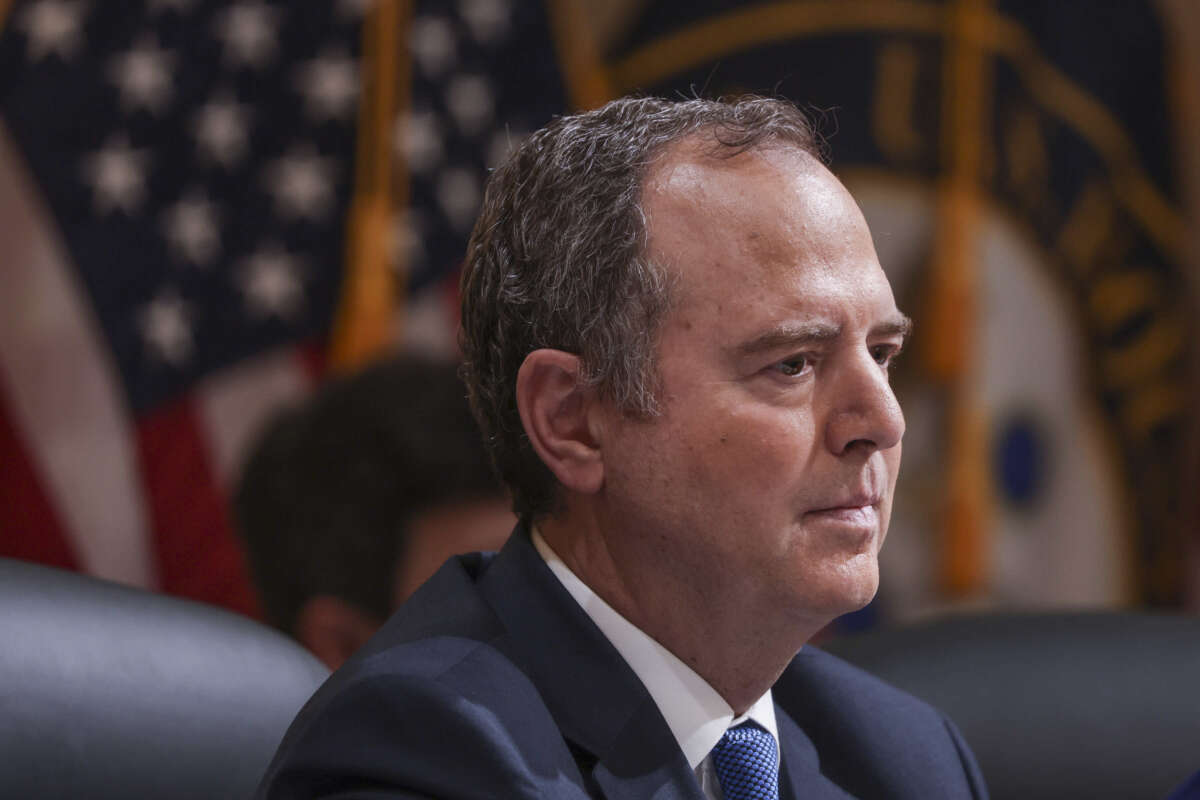Legislation that would have handed President-elect Donald Trump sweeping power to investigate and shutter news outlets, government watchdogs, humanitarian organizations, and other nonprofits was defeated in the House of Representatives on Tuesday after a coalition of progressive advocacy groups and lawmakers mobilized against it, warning of the bill’s dire implications for the right to dissent.
But 52 Democratic lawmakers — including Reps. Adam Schiff (D-Calif.), Henry Cuellar (D-Texas), and Ritchie Torres (D-N.Y.) — apparently did not share the grave concerns expressed by the ACLU and other leading rights groups, opting to vote alongside 204 Republicans in favor of the bill.
One Republican, Rep. Thomas Massie of Kentucky, joined 144 Democrats in voting no.
The measure ultimately fell short of the two-thirds majority needed to approve legislation under the fast-track procedure used by the bill’s supporters, but progressives wasted no time spotlighting the Democrats who supported the measure.
“If you’re looking for a handy list of Democrats who have no fucking clue what is about to hit and need their spines stiffened ASAP, this is a good place to start,” wrote Leah Greenberg, co-executive director of the advocacy group Indivisible.
Rep. Rashida Tlaib (D-Mich.), who vocally opposed the legislation, wrote that “these 52 Democrats voted to give Trump the power to shut down any nonprofit he wants.”
“The NAACP, ACLU, Planned Parenthood, no organization would be safe,” Tlaib added. “Shameful.”
The 52 Democrats who voted in favor of a bill that would empower the Treasury Secretary to revoke nonprofit tax status of orgs based on judgment they're “terrorist-supporting.”
— Prem Thakker (@prem_thakker) November 13, 2024
There were concerns the bill would help government (especially Trump's) attack pro-Palestine groups. https://t.co/b5sybBDHPL pic.twitter.com/ueTc9dNyDF
If passed, the Stop Terror-Financing and Tax Penalties on American Hostages Act would grant the Treasury Department — soon to be under the control of a Trump nominee — the authority to unilaterally strip nonprofits of their tax-exempt status by deeming them supporters of terrorism.
The bill could be revived in the next Congress, which is likely to be under full Republican control.
Kia Hamadanchy, senior policy counsel with the ACLU, told The Intercept late Tuesday that “we will continue our sustained opposition.”
It is already illegal under U.S. law to provide material backing for terrorism, and the executive branch has significant authority to target groups it considers terrorist-supporting.
The ACLU noted ahead of Tuesday’s vote that while the bill contains “a 90-day ‘cure’ period in which a designated nonprofit can mount a defense, it is a mere illusion of due process.”
“The government may deny organizations its reasons and evidence against them, leaving the nonprofit unable to rebut allegations,” the group said. “This means that a nonprofit could be left entirely in the dark about what conduct the government believes qualifies as ‘support,’ making it virtually impossible to clear its name.”
Opponents of the bill warned that Palestinian rights organizations would be uniquely imperiled if it passed.
“This bill dangerously weaponizes the Treasury against nonprofit organizations and houses of worship — Christian, Jewish, or Muslim — that dare to support Palestinian and Lebanese human rights or criticize Israel’s genocidal actions,” said Robert McCaw, director of government affairs at the Council on American-Islamic Relations.
“Allowing such sweeping, unchecked power would set a chilling precedent, enabling the government to selectively target and suppress voices of dissent under the guise of national security,” McCaw added. “This isn’t just an attack on our communities; it’s a fundamental threat to free speech and democracy.”
Georgia State Rep. Ruwa Romman (D-97), a Palestinian American, echoed that sentiment following Tuesday’s vote and condemned the legislation’s 52 Democratic supporters.
“Every single Democrat who voted for this is not taking the threat of Trump remotely seriously and should be disqualified from any leadership positions moving forward,” Romman wrote on social media. “This is no longer business as usual. To agree to give him this kind of power is beyond egregious.”
Our most important fundraising appeal of the year
December is the most critical time of year for Truthout, because our nonprofit news is funded almost entirely by individual donations from readers like you. So before you navigate away, we ask that you take just a second to support Truthout with a tax-deductible donation.
This year is a little different. We are up against a far-reaching, wide-scale attack on press freedom coming from the Trump administration. 2025 was a year of frightening censorship, news industry corporate consolidation, and worsening financial conditions for progressive nonprofits across the board.
We can only resist Trump’s agenda by cultivating a strong base of support. The right-wing mediasphere is funded comfortably by billionaire owners and venture capitalist philanthropists. At Truthout, we have you.
We’ve set an ambitious target for our year-end campaign — a goal of $150,000 to keep up our fight against authoritarianism in 2026. Please take a meaningful action in this fight: make a one-time or monthly donation to Truthout before December 31. If you have the means, please dig deep.
